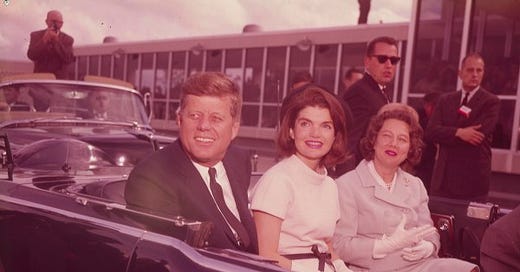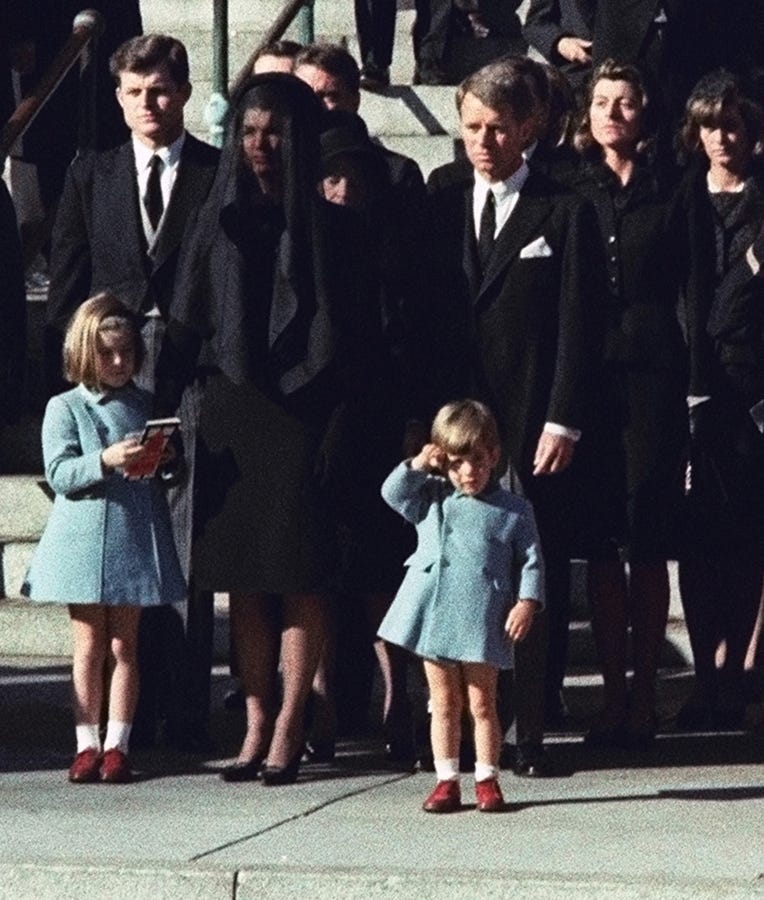Sixty Years Ago Today …
President John Kennedy moved through San Antonio like a mythical hero from a dream – young, handsome, vibrant, charismatic, powerful – and Catholic. The next day, the dream became a nightmare.
(Welcome to a very special Life Its Ownself newsletter. For people born in the middle of the American Century, the assassination of President John Kennedy was the defining event of their youth. For me, a young, Catholic Texan, the events of November 21-25, 1963, are sculpted deep in my memory.
If you enjoy reading this, please let me know by 1) hitting the Like button at the bottom, 2) subscribing to this newsletter, and 3) recommending it to others. Also, feel free to comment below. I’d love to hear your thoughts.)
But first, your moment of Zen … President and Mrs. Kennedy, along with Nellie Connally, in San Antonio on November 21, 1963. Photo courtesy the San Antonio Express-News.
Tuesday, November 21, 2023, 11:00 a.m.
It was a Thursday, and a special day for the students of St. Peter, Prince of the Apostles grade school in San Antonio. President John Kennedy was coming to San Antonio and his motorcade would be driving down Broadway Avenue, only half a block from the school building.
I was in fourth grade; my two sisters were in third and first grade respectively. Our teachers led us out of our classrooms and down to Broadway, then as now one of San Antonio’s main throughfares. We assembled on the tidy lawn of the San Antonio Savings Association building at the corner of Broadway and Barilla. While we waited, our teachers gave my sisters and me permission to stand with our father, who had taken off work and met us there.
Soon we heard the police sirens approaching. Suddenly the motorcade was upon us. I was trying to keep track of all the cars whizzing by and didn’t recognize the President and Jackie in their car until they were almost beyond us. I waved even more strenuously; certainly they’d see me amidst all the people and noise and movement!
After the hullabaloo was over, my sisters and I said goodbye to my Dad and returned to school with our classmates. I doubt we got much learning done the rest of that day – how could we? We’d seen, up close and personal, our nation’s young, handsome – and Catholic – President! It was a thrilling day that promised to be a lifelong memory.
And then came Friday.
It’s hard to overstate how much, to Catholics in the early 1960s, President John Fitzgerald Kennedy was a big deal. He was the first Catholic president in our nation’s history. (And still a rarity: of 46 presidents, only he and Joe Biden have been Catholic.) His Catholicism had been a big issue during the 1960 election, with many fearing that he would somehow be compelled to take orders from the Vatican. He worked to reassure voters – including in a memorable speech to the Houston Ministerial Association in September 1960 – that he would be a President without fear or favor to any religious tradition.
The hero worship was even stronger in our household and at my school. Both my parents were cradle Catholics. My mother was Irish American and immensely proud of a Kennedy in the White House. The nuns who taught at St. Peter’s – more than half the faculty – were all from Ireland and had the brogue to prove it.
Friday
Early Friday afternoon, we were summoned to the church, where the pastor told us President Kennedy had been shot in Dallas just a little while before. For us children, who had seen him in all his glamour and vitality the day before, this seemed impossible. We were shocked and horrified.
But it was the reaction of the nuns that still, to this day, is my strongest memory. The nuns, strict and formal in all their interactions with us, were the most terrifying things I knew. And yet, here they were, reduced to sobbing and wailing, bereft of all succor in their anguish.
Eventually the priest calmed everyone down enough to lead some quick prayers for President Kennedy’s speedy recovery. We returned to our classrooms, in some of which TVs were quickly turned on. There we learned that Kennedy had died of his wounds. Our parents were called, and everyone was sent home for the weekend.
That evening, we watched on TV as the President’s body arrived back in Washington, his casket lowered from the fuselage of Air Force One as his widow stood nearby, still in her bloodstained clothes.
(Jackie Kennedy at Andrews Air Force Base: “Let them see what they have done.”)
Saturday
The weekend was surreal. Every American family that had a TV was glued to their set, watching more information trickle in. There were pictures of the new President, Lyndon Johnson of Texas, being sworn in in a cramped aisle of Air Force One.
We also learned that a suspect had been arrested in Dallas, and that he may have killed a policeman while trying to escape the dragnet thrown up around him.
Sunday
On Sunday, we attended a special Mass at St. Peter’s for the slain president. After we got home my father, as he did every Sunday, made breakfast for the family. I was watching the TV in the living room as they began to move Lee Harvey Oswald from one jail to another. While they transferred him, he was shot by Jack Ruby live on national television. I remember going into the kitchen and telling my father, “Someone just shot Oswald!”
In Washington, the President’s body lay in state in the Rotunda of the Capitol Building. All afternoon and into the night, some 250,000 people passed by to pay their respects.
Monday
Monday was the burial, carried live on national television. The ceremony was somber and stately, modeled on the burial of Abraham Lincoln almost a century before. I remember being transfixed watching the elegant dignity and grace of Mrs. Kennedy and her young children. Little John-John’s salute became an iconic image of the nation’s grief.
I also remember the powerful imagery of the riderless horse, boots reversed in the stirrups. Like all good symbols, I did not have to intellectually grasp all its meanings to be moved by its gravity.
This was how I saw and experienced that weekend. Over time, additional layers of meaning were grafted onto those images. But the experience itself, from Thursday’s motorcade to Monday’s funeral, remains a defining one of my youth.
Concluding Thoughts
I wanted to write about those November days because, more than any other event, they shaped my understanding of the world during my formative years, both for good and bad. The sordid brutality of the assassination itself and the majestic pomp and circumstance of the nation’s farewell. A vicious act of hatred in Dallas, followed by hundreds of the world’s leaders coming together in a show of unity, respect and continuity.
It’s also hard to understate how much the Kennedy assassination rattled us as a nation. If a President, heaven forbid, were to be assassinated today, it’s unlikely we’d view it as the opening gambit of a world war. But many people viewed the Kennedy assassination that way. Tensions between the NATO countries and the Soviet bloc were always high; barely a year before, Kennedy had forced the Soviets to remove offensive nuclear weapons from Cuba, only 90 miles away. The myth that you could kill the head of government and the country would collapse was still alive then. That’s why Lyndon Johnson thought it important to be sworn in before the entourage left Dallas, and to be seen doing it.
Some people view the Kennedy assassination as a cataclysmic event exposing the deep, festering rot at the heart of America’s postwar hegemony. In this view, Kennedy was the avatar of a new, and dangerous, leadership style. The assassination was a conspiracy, carefully planned and orchestrated at the highest levels of America’s business and government leadership, with help from foreign and criminal elements whose very participation was a betrayal of the nation’s ideals. My friend James Moore has written eloquently about this worldview, including in an essay last weekend.
For me, the assassination was a great national tragedy, from which we have not recovered. It was, to borrow Don McLean’s phrase, “the day the music died.” (McLean was writing about Buddy Holly, not JFK.) My personal viewpoint is shaped by the very peripheral but intense (for me) role I’ve described above.
Don DeLillo (White Noise, Underworld) has written an intriguing novel about the Kennedy assassination called Libra. The book details a conspiracy to assassinate Kennedy, but it’s all low-level CIA bureaucrats, Mafia hangers-on, and Cuban revolutionary wannabes. The conspiracy is accidental in its success.
There’s no doubt the assassination was a landmark event in the 1960s. Was it an omen of things to come – the Vietnam quagmire and national waves of protest; racial unrest and riots in many major cities; the assassinations, within the next five years, of Medgar Evers, Malcolm X, Martin Luther King, Jr., and Bobby Kennedy; the chaos of the 1968 and 1972 presidential elections – or was it the proximate cause of all that?
I have no answers to these questions. I only know that, in my life, there was a beforethe assassination and an after, and the after-world was a different, less trustworthy place.










Beautifully stated. A very complete description of the historical and emotional moment. Thanks.
I think back to a small Baptist church in 1960 in south Dallas County. The preacher was warning against the Vatican taking over America. The deacons were in place in the front pew. One of the deacons, a local attorney over six feet tall with a commanding baritone voice, stood, turned his back to the pulpit, and in a stage whisper which interrupted the "sermon," said, "I don't have to listen to garbage." That preacher's tenure was cut short in the following months. That encapsulated for me the split in our suburban community.